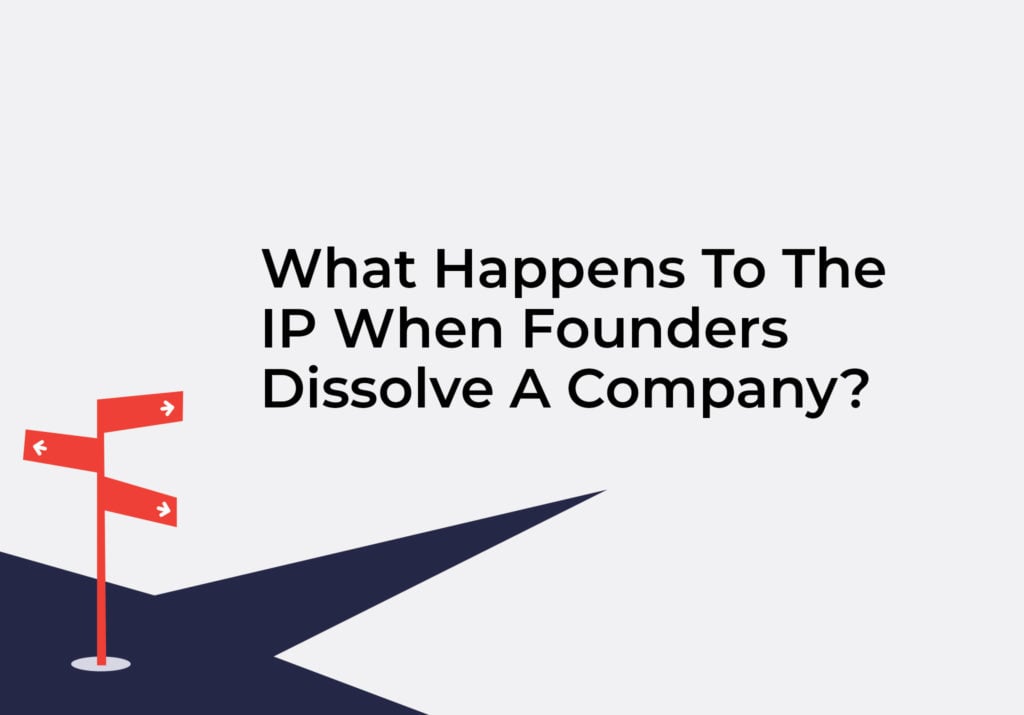In the second half of 2020, new business formations were up 40%, an all-time high for startups. While the founders behind these companies hope for the best and have big dreams, the sad truth is that many will ultimately fail.
So, what happens to the IP when founders dissolve a company? When a company forms and grows, it acquires property, including intellectual property. Upon dissolution, this property needs to go somewhere. The company no longer exists, so a new owner needs to take over the rights.
If you are the founder of a startup, it’s critical that you know what happens to the IP should your business dissolve.
Who Owns the Patents & Trademarks After a Company Is Dissolved?
Intellectual property is an asset for the company. It’s treated the same as real estate or physical property. The majority of the time, all of the company assets get sold at auction.
If the company goes into bankruptcy, all assets are liquidated and sold for a fraction of their value at auction. This includes any intellectual property assets that are in the company’s name. Anyone has the opportunity to participate in the auction and purchase the IP.
However, this can get quite expensive. The proceeds from this auction go to pay employees, outstanding taxes owed, creditors, and shareholders.
A similar type of sale happens when the founders of the company voluntarily dissolve the company. If the founders do not have an agreement for ownership retention, then the IP gets sold with the other assets.
On a rare occasion, a company will close without selling the intellectual property. In this situation, the ownership is acquired by the shareholders. However, this is rarely documented and often transferred incorrectly.
Can Founders Continue Using the Dissolved Company’s Trade Secrets?
The short answer is that it depends. Look to the formation agreements and any other documentation relating to the company.
Many will have stipulations as to what happens with the intellectual property. If the company documents are silent on this, check with the state law. Some states have regulations that outline what happens when the company documents are silent on this topic. Unless prohibited by company agreements or state law, a founder can continue to use the trade secrets.
Avoiding IP Pitfalls
With some planning and forethought, you can avoid common IP pitfalls, which are typically mistakes that company founders make when forming and growing their startups. But even after formation, a company is not foreclosed from auditing their formation agreements, employee agreements, trade secret policies, etc.
Failing to Make a Plan
Many founders make the mistake of undervaluing or not even considering IP during their formation. These intangible assets can become invaluable and need to be accounted for. Create a plan that identifies existing and possible future IP assets. Address their ownership and the procedures for company dissolution.
An IP strategy should also include periodic reviews. This ensures that all necessary safeguards are in place and that nothing slips through the cracks. These reviews also ensure that the IP protections make sense with the growing business. As your business grows, it can make sense to adjust your IP protection strategy.
Not Protecting Confidentiality
Understand the extent and importance of confidentiality early on. Many founders make the mistake of public disclosure, which precludes them from filing a patent application. Work with an IP attorney early on to understand what you should and should not disclose during pitch events, investor meetings, on the company website, or otherwise in public.
It’s also imperative to have a well-drafted Non-Disclosure Agreement (NDA). This document lets you disclose necessary information to potential investors for the growth and continuation of your business. An NDA should be signed by anyone who may have access to your protected IP.
Failing to Establish Clear Ownership
Failing to establish clear ownership rights early on opens the door for dispute later. During dissolution, founders can delay the process by disrupting rightful ownership. During the sale of IP, due diligence by potential buyers will reveal a question of ownership, which can be a deal-breaker for the majority of buyers. If a buyer is still interested, it may be at a significantly discounted price.
Using Poorly Drafted Documents
IP law is not like contract law. Do not ask any attorney you happen to know for assistance preparing or reviewing these agreements. It’s crucial that you work with an experienced IP lawyer who can craft well-executed agreements covering topics such as:
- Employment
- Consulting
- Funding
- Collaboration
- Settlement
- Licensing
- Research
- Material transfer agreements
This will help to make them effective and enforceable. Your IP documents need to address a wide variety of potential situations. This can save you expensive legal fees later when a dispute arises that could have been addressed with a solid IP agreement.
Selling or Transferring Intellectual Property
There are two common methods for transferring intellectual property. You can use an Asset Purchase Agreement or an Asset Assignment Agreement. While both documents accomplish the same thing, they have different functions and are best in certain situations.
A purchase agreement is used when you sell the right to your intellectual property to the buyer. An assignment agreement is used when you assign your rights to your IP to the buyer. There are generally more stipulations and provisions attached to a purchase agreement. Consult with an attorney before you decide which is best for your situation.
Experienced IP Attorneys
If you own a company that’s acquired IP, you need to know what happens to the IP when founders dissolve the company. While no one wants to think about their company failing, it’s essential to plan for the unexpected.
If your original formation documents do not mention this, it’s not too late. Your next step should be to speak with an attorney and discuss what IP the company owns and your options.
Request a free consultation today and speak with one of our experienced and knowledgeable attorneys about your company’s IP.



